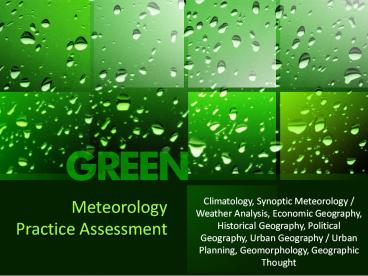Meteorology Practice Assessment - PowerPoint PPT Presentation
Title:
Meteorology Practice Assessment
Description:
Climatology, Synoptic Meteorology / Weather Analysis, Economic Geography, Historical Geography, Political Geography, Urban Geography / Urban Planning, Geomorphology, Geographic Thought – PowerPoint PPT presentation
Number of Views:45
Title: Meteorology Practice Assessment
1
Meteorology Practice Assessment
- Climatology, Synoptic Meteorology / Weather
Analysis, Economic Geography, Historical
Geography, Political Geography, Urban Geography /
Urban Planning, Geomorphology, Geographic Thought
2
1. What is the atmospheric layer where most
weather occurs Discuss
- A.
- Thermosphere
- B.
- Mesosphere
- C.
- Troposphere
- D.
- Stratosphere
3
2. What happens to temperature as you move
upwards through the troposphere
- A.
- It decreases
- B.
- It increases
- C.
- It stays the same
- D.
- It varies from place to place
4
Where do meteors burn up?
- A.
- Stratosphere
- B.
- Thermosphere
- C.
- Troposphere
- D.
- Mesosphere
5
4. Where do the northern lights occur
- A.
- Mesosphere
- B.
- Thermosphere
- C.
- Exosphere
- D.
- Stratosphere
6
5. Where is the ozone layer?
- A.
- Mesosphere
- B.
- Stratosphere
- C.
- Troposphere
- D.
- Exosphere
7
6. What happens to temperature as you move up
through out the atmosphere
- A.
- It stays the same
- B.
- It increases
- C.
- It decreases
- D.
- It varies
8
7. What does the ozone layer do?
- A.
- It blocks infrared radiation
- B.
- It protects us from meteors
- C.
- It protects us from ultraviolet radiation
- D.
- It causes the sky to be blue
9
8. The hydrosphere contains
- A.
- Clouds, rivers, lakes
- B.
- Oceans, mountains, rivers
- C.
- Ice, smoke and dust
- D.
- Water vapor, chickens, and soda
10
9. Water stored under the ground is called
- A.
- Landwater
- B.
- Groundwater
- C.
- Runoff
- D.
- Precipitation
11
10. Evaporation is when water turns from a
- A.
- Gas to a solid
- B.
- Solid to a gas
- C.
- Liquid to a gas
- D.
- Liquid to a solid
12
11. Condensation is when water turns from a
- A.
- Solid to a gas
- B.
- Gas to a solid
- C.
- Liquid to a gas
- D.
- Gas to a liquid
13
https//sciemce.com































